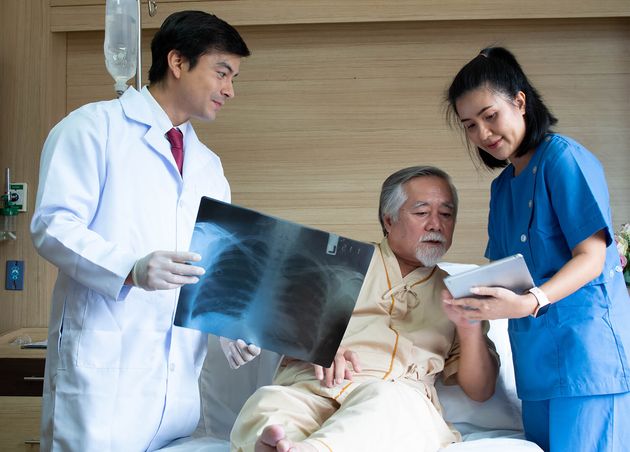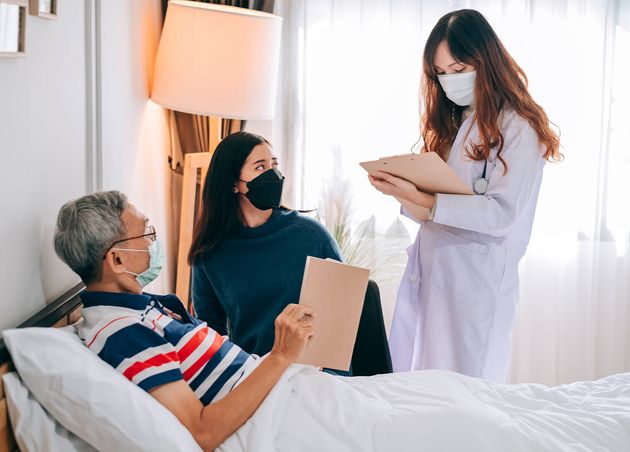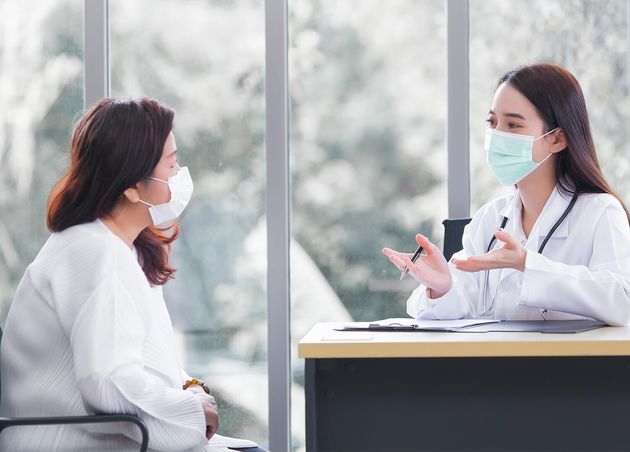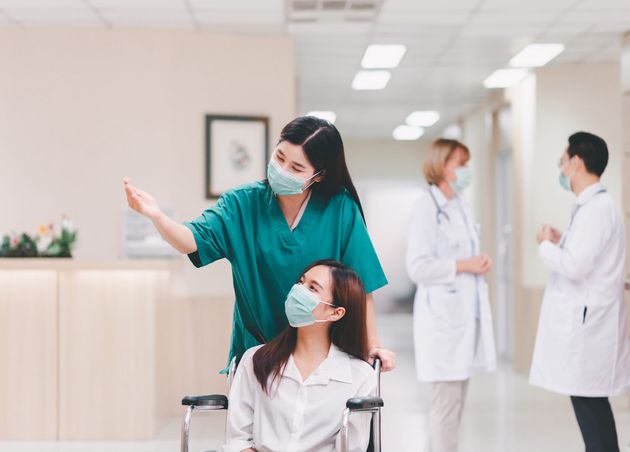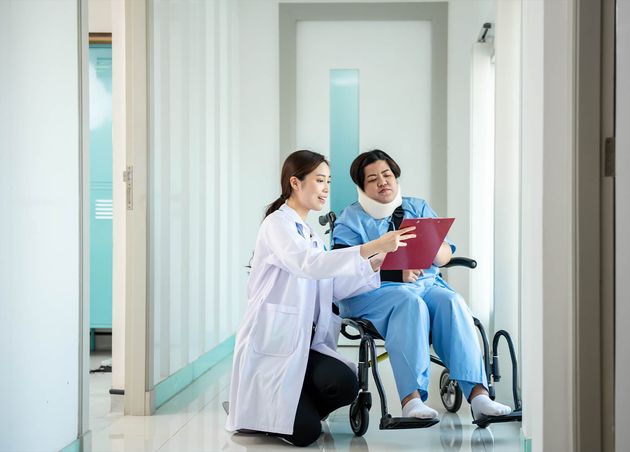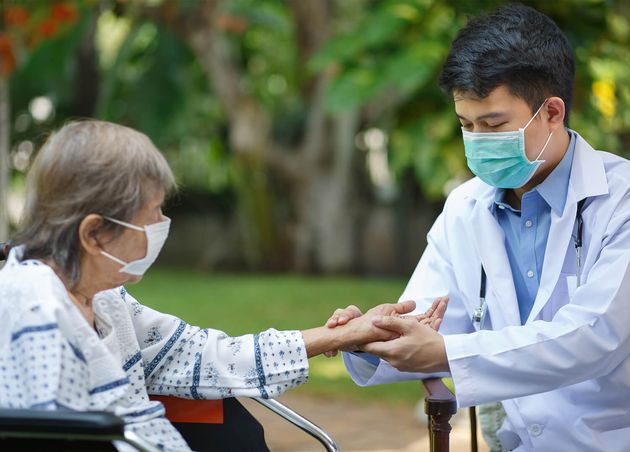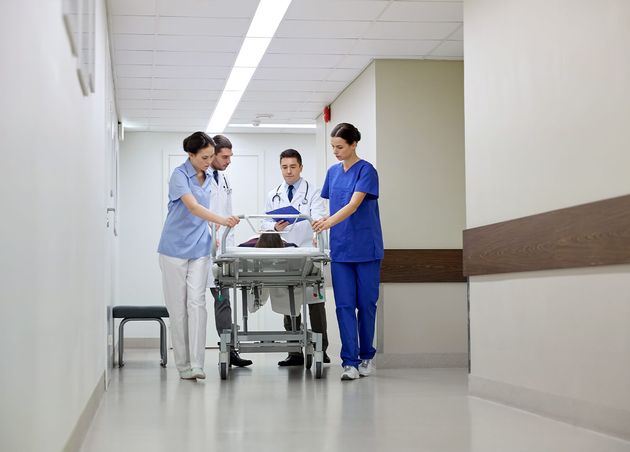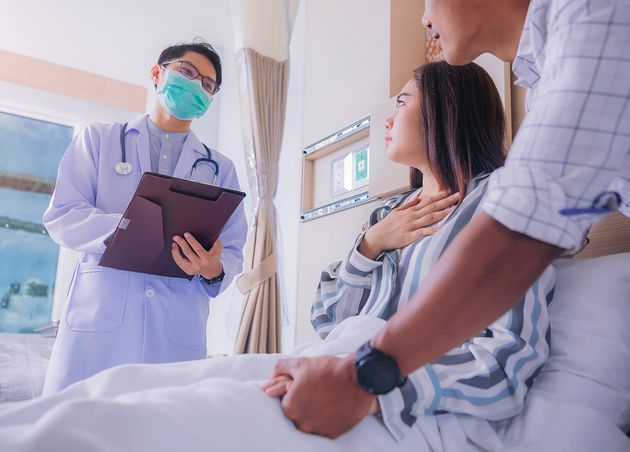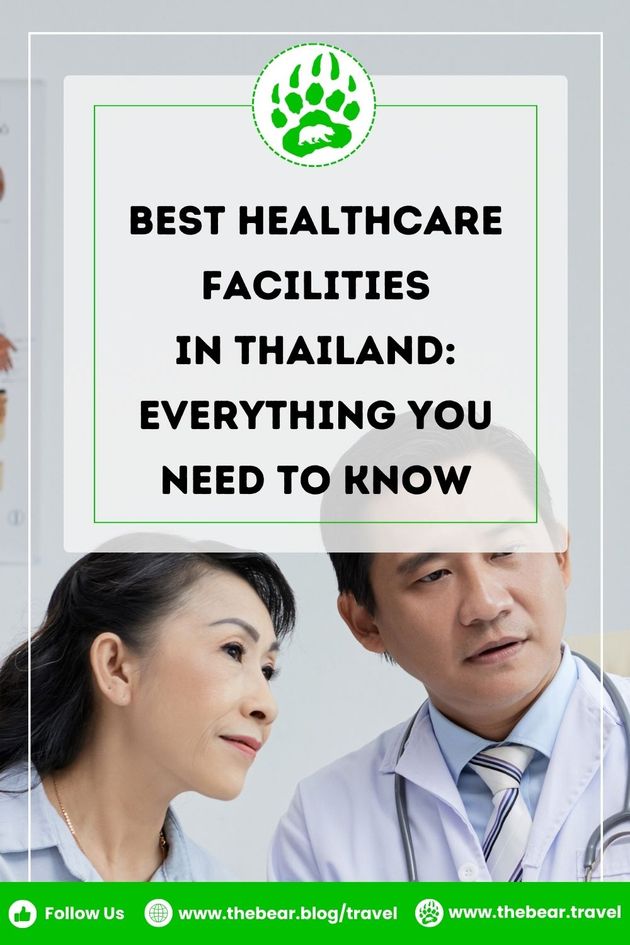Best Healthcare Facilities in Thailand: Everything You Need To Know
Would you like to visit Thailand but think about its health services? You might be worried about your health when planning vacations in Thailand.
No worries, healthcare in Thailand is of excellent quality, which is good news for worldwide travelers hoping to visit.
Today we bring you everything you need to know about health care in Thailand and solutions to all your problems about health care facilities in the country.
We covered all the sections of health services in Thailand. So let's look at how robust the healthcare system in Thailand has and how you can benefit from it during your stay.
Explore Thailand's Exceptional Healthcare Services in Under a Minute
- High standard treatments
- Talented and qualified doctors
- High-quality government and private hospitals
- Emergency transport facilities
- Reasonable cost
- Availability of high-tech facilities
- Availability of medical centers in tourist destinations
- High-quality pharmacies
Thailand: A Hub for Superior Medical Facilities
Thailand is one of the top countries in the world for people hoping for excellent medical treatment. And also, it is a core for progressive healthcare services, high-quality medical care, and reasonable expenditure. They have highly experienced doctors and a supporting medical team.
The hospitals in Thailand grade among some of the best medical facilities and give clients an international standard of medical care. The quality of diagnosis, medication, and preventative health services in Thailand is comparable to the world's best hospitals.
The hospitals offer a comprehensive range of outpatient and inpatient services, featuring a diverse selection of room categories, ranging from shared beds to luxurious suites. Additionally, these medical facilities have state-of-the-art laboratories, modern operating theaters, well-appointed intensive care units, and rehabilitation centers.
These hospitals have various amenities, including advanced diagnostic laboratories, imaging centers, blood banks, emergency medical services, ambulance services, Wi-Fi connectivity, diverse dining options, and dedicated prayer rooms. Furthermore, they extend specialized services tailored to international patients, such as airport transportation, language interpretation, visa assistance, accommodation arrangements, and more.
Healthcare and Medical Services in Thailand
Most doctors in tourist regions speak English, usually attainable soon, and the price level is satisfactory. Many doctors are specialized in a specific field. A general practitioner is not certainly easy to get at. Only essential healthcare is available outside the tourist areas.
In Bangkok, high-quality private hospitals include, for example, the Samitivej Hospital, Bangkok Hospital, Phyathai Hospital, and Bumrungrad International Hospital. In the Pattaya region, high-quality healthcare services are available at the hospitals like Bangkok Hospital Pattaya and the Pattaya Memorial Hospital.
Furthermore, at least the Chiang Mai Ram Hospital offers high-quality treatment in Chiang Mai. In Phuket, the Bangkok Hospital Phuket and the Phuket Provincial Hospital provide treatment of an international standard. The Bangkok Hospital chain generally has a high-quality standard, and its hospitals are accessible nationwide. Delicate in urban areas, the doctors working at the hospitals generally attend to patients at small private clinics in the evenings.
Travelers to Thailand should obtain comprehensive travel insurance. In case of disorder, the journey home will be precious and impossible to organize without private travel insurance. Treatment usually begins after the insurance company issues a statement or an advance payment. The hospitals frequently expect fees in cash. Private and state hospitals usually also approve credit cards. Always take your insurance card with you on the trip.
Dental services in Thailand are primarily of good quality. In Krung Thep Maha Nakhon (Bangkok), for example, many large dental hospitals and clinics exist. Dental care is usually also available in regular hospitals, in both the private and public sectors. There are usually cues in the public sector. Both dental care and other healthcare are attainable at highly varying levels and prices. High-quality dental hospitals in the capital include Bangkok International Dental Hospital and Bangkok International Dental Clinic.
You should know that ambulance services are relatively reasonable in Thailand. The larger hospitals sometimes have ambulances where emergency treatment can be launched shortly. However, first-response treatment is usually given by volunteer organizations.
If you believe that your prevailing medical situation may expect emergency treatment while traveling in Thailand, it is suggested that you stay near one of the hospitals. It will confirm that you receive quick treatment when needed.
Public Healthcare Services in Thailand
The healthcare system in Thailand includes government-sponsored medical care managed by the Medical Services Department, under the oversight of the Ministry of Public Health. Public health services in the country are generally of good quality. However, government hospitals are often busy, leading to longer patient waiting times.
Public healthcare facilities, including government hospitals, offer services that are generally satisfactory. Thai citizens with a Universal Coverage Health Card can receive medical treatment at no cost, except on Saturdays when minor charges may be involved. The National Health Security Office issues the Universal Coverage Health Card. Non-Thai individuals are required to pay standard fees for services, which are typically lower than what private hospitals would charge.
Thailand boasts over 1,000 public sector hospitals, which provide a high standard of medical care. These public hospitals are widely used by both Thai citizens and foreigners residing in the country.
Private Healthcare Sector in Thailand
Thailand stands as one of the prominent medical tourism hubs in Asia. Most private hospitals in the country have outstanding medical facilities and staff. Private hospitals in Thailand are first-rate and always employ staff educated at Western universities.
While private treatments are about twice the expense of public treatments, it's inexpensive than what tourists coming from Europe or the United States may be used to. Despite the acceptable cost of treatments, tourists should ensure they have medical insurance for bad health conditions or when primary techniques are needed.
The biggest private hospitals are in Krung Thep Maha Nakhon (Bangkok), and traveling to one of these world-class medical institutions is the stablest choice in an urgent injury or medical circumstance.
🧑🎓 Quick Trivia!
Thailand's reputation as a prime medical tourism destination in Asia is largely attributed to its high-quality medical care and cost-effective treatment options. This has positioned the country as a sought-after destination for various medical procedures such as cosmetic surgery, eye surgery, and dental care. Notably, some medical facilities catering to international medical tourists resemble luxury hotels rather than conventional hospitals. This trend is particularly prominent in the southern regions of Thailand, where medical procedures are promoted alongside relaxing beach vacations.
Non-Profit Health Organizations in Thailand
Thailand is fortunate to host a range of prominent agencies dedicated to uplifting the lives of disadvantaged individuals and communities. Among these organizations, the Red Cross, World Vision, and Médecins Sans Frontières (also known as Doctors Without Borders) hold notable significance. These agencies work diligently to address various challenges vulnerable populations face, ranging from disaster relief and healthcare to poverty alleviation and education.
The Thai Red Cross Society, with its comprehensive programs and swift responses to emergencies, showcases the nation's commitment to providing humanitarian aid. Similarly, World Vision's focus on empowering marginalized children and families aligns with Thailand's dedication to fostering brighter futures. Meanwhile, Médecins Sans Frontières' medical interventions exemplify the compassion and global outlook that characterize Thailand's humanitarian landscape.
These agencies symbolize Thailand's dedication to extending assistance and hope to those in need within its borders and beyond. Their efforts embody the country's core values of unity, empathy, and solidarity, reinforcing its status as a compassionate and caring nation on the international stage.
Medical Professionals in Thailand
Most of the doctors in Thailand are consultants. Finding a reliable general practitioner to treat minor medical issues may be difficult. At a general hospital, you will most likely be investigated by a doctor who is a specialist in a specific field. It may be hard for this specialist to deal with many more minor medical diseases that you might have. The best idea for you might be to seek an internist as your first alternative.
Leading hospitals in Thailand still employ family doctors or medical practitioners. Moreover, it's common for many doctors in Thailand to have multiple workplaces. Thai surgeons and physicians often hold positions in various hospitals throughout the city. Additionally, some doctors maintain their private clinics.
As a result, medical professionals in Thailand frequently move between different hospitals to conduct their medical rounds. Despite this arrangement, you can expect to find highly skilled and experienced doctors to address your healthcare needs in Thailand.
Pharmaceutical Services in Thailand
Thailand boasts many pharmacies scattered throughout both urban areas and rural villages. While many are independent establishments, there are also chain pharmacies present. These pharmacies are typically identifiable by white signs adorned with green crosses and green lettering. Operating hours for most pharmacies extend throughout the week, though on Sundays, their hours might be limited to just a few.
Formal medications are not always wanted for treatment; many people go straight to a pharmacist if they are sick. Tourists are advised to see a doctor for any medical disorders. Still, they should remember that hospital pharmacies are more expensive than independent stores in cities. Moreover, most qualified pharmacists can give medical advice in English.
Approaches to Medical Care
The standard of the pharmacies varies. Hospitals typically have pharmacies related to them. Obtaining your medicines there when visiting a doctor is a big idea. The selection of medicines varies according to the standard of the hospital and pharmacy.
The pharmacies generally provide expensive original products and less expensive generic options. However, some medicines may be highly costly in Thailand, especially basic medicinal products. Moreover, in remote areas, the availability of medicines is less specific.
When taking medicines into or out of Thailand, you should check the list of restricted medicinal elements available—taking a medical prescription in English for any medicines subject to authorization. Whether medicine is subject to authorization should be checked with the health authorities of Thailand. When instructed, the Thai authorities should request written permission in advance.
Medical Facilities in Thailand
Thailand features two primary categories of hospitals: government-run and private establishments. Both options provide medical care for a diverse array of conditions. However, they offer distinct experiences due to variations in facilities and services. Additionally, Premium Clinics are available, and you can explore further details in the information provided below.
#1 Government Hospitals
Government hospitals can be a great choice if you’re looking for the most suitable medical treatment in Thailand. They usually offer lower prices than private hospitals. In addition, they don’t increase the cost of medications.
The Ministry of Public Health or medical schools usually governs government hospitals in Thailand. Most of them put their focus on low-cost medical treatment for Thai citizens. Since these hospitals receive a significant number of patients every day, you might have to wait a few hours to meet a doctor. Due to this reason, some people attain early to stop long cues. However, you might want to wait again for your treatment once you see a doctor.
While the hospital staff is peaceful and pleased to help you, they won’t have much time to spend on you because the hospital is always packed. Thus, it’s essential to be patient if you need their assistance. Unfortunately, there are no international help desks in government hospitals. Still, most of the staff can communicate in basic English. However, bringing a translator or a Thai friend to help you communicate with the staff is still a great impression.
#2 Premium Clinics
Premium clinics represent a distinctive healthcare option within select government hospitals across Thailand. These specialized clinics offer a range of advantages, including extended operating hours, access to highly experienced medical professionals, and reduced wait times for patients. While the expenses associated with treatment in premium clinics are comparatively higher than standard government hospital services, they remain significantly more affordable than private hospital care.
The introduction of premium clinics addresses the evolving needs of patients by providing a middle-ground solution between government and private healthcare facilities. The availability of experienced doctors and the convenience of extended hours contribute to the growing appeal of these clinics, making them a valuable addition to Thailand's healthcare landscape.
#3 Private Hospitals
Private hospitals should be your top choice if you don’t want to waste your time waiting to see a doctor. Besides offering shorter stays, these hospitals are known to offer more experienced medical practitioners, excellent customer service, and well-trained staff. The customer service is better, and the staff is more attentive because private hospitals aren’t usually too crowded.
In addition, these hospitals usually offer top-tier facilities, modern medical technology, and similar medication levels as hospitals in the UK and the US. With everything private hospitals offer, expect to pay more than you would in a government hospital.
However, medical treatment in Thailand’s private hospitals is cheaper than in the West. Millions of people worldwide, or medical tourists, even fly to Thailand to get treatment at private hospitals.
Navigating the Journey to a Hospital
You will need to complete the registration process during your initial hospital visit. This will assign you a hospital number that you will use for all subsequent appointments. While it's possible to register on the day of your visit, pre-registration is also an option. Although many hospital staff members have a basic command of English, having an interpreter on hand could be beneficial.
Certain larger public hospitals have specialized 'premium clinics' available. These clinics offer advantages such as shorter wait times, extended operating hours, and access to more experienced medical professionals. While the fees for services at these clinics are higher, the generated income often goes toward supporting patients needing intensive treatments but lacking the financial means. This approach underscores Thailand's commitment to offering quality healthcare services while also addressing the needs of disadvantaged individuals.
Once you find the best hospital for your treatment, the next thing you need to do is plan an appointment. For government hospitals, you usually can’t make an appointment online. Instead, you’ll have to go and talk with the staff. In private hospitals, you can usually make an appointment online.
- Reports you need to bring
- As a foreigner, you must use your passport to register for hospitals. Even if you have already scheduled an appointment online, you should still bring your passport whenever you visit the hospital.
- If you have health insurance, bringing your insurance card to show to the hospital staff during registration is essential.
- Hospital Arrival
- Even when you can set up an appointment in a government hospital, arriving as early as possible’s still a good idea. You’ll need to fill in registration forms and get a queue number before seeing a doctor, so if you delay attending, you might not see a doctor that day.
- Suppose you make an appointment in a private hospital. In that case, you should arrive at least 30 to 40 minutes early to prevent any problems. Registering, getting a check-up, and staying at your doctor's usually takes around 30 minutes.
- Getting Admitted
- You can select your stay if you want to be admitted to a hospital. Private hospitals also offer VIP rooms and royal suites along with private and shared rooms.
- These rooms are usually costly by Thai standards, but they have more conveniences and even tasteful decorations that resemble 5-star hotels.
- Paying for Hospital Bills
- If you don’t have health insurance in most hospitals in Thailand, you’ll need to pay out of pocket for your hospital bills right after your treatment. However, you can usually pay by cash, debit, or credit card, keep the receipts, and apply for reimbursement from your insurance company.
- But if you have health insurance and your insurance company is a hospital partner. In that case, all you have to do is sign some documents, and you don’t have to pay anything.
- In general, you might have to follow the following steps:
- Go to the pharmacy, drop off your prescription, and get a queue number
- Wait until a cashier calls your name and queue number
- Pay your medical bill at the cashier
- Get your medication
- Finding the Right Hospital
- The Internet is the easiest way to look for a hospital in Thailand.
- Most hospitals, especially private hospitals, will have a website that provides info in English and several other languages.
What Level of Healthcare Quality Can You Anticipate in Thailand?
Thailand's healthcare system has garnered international recognition, securing a sixth-place ranking on the global healthcare index. The country boasts a commendable standard of healthcare, often offering treatments that are both superior and more affordable than what can be found in certain Western nations.
However, the concentration of medical facilities is notably higher in major urban centers, particularly in the capital city of Krung Thep Maha Nakhon (Bangkok). Conversely, rural regions, especially in Northeast Thailand, suffer from a shortage of medical professionals, indicating disparities in access.
The healthcare workforce primarily comprises Thai nationals, and the nation is committed to embracing medical advancements. This commitment extends to digitalizing services and embracing new solutions such as medicinal marijuana, a relatively uncommon concept in other Asian countries.
Thailand's prominence in medical tourism is evident, ranking within the top five countries globally. Inbound medical tourism contributes significantly to the economy, accounting for around $589 million, or approximately 1% of the total tourism expenditure. While cosmetic surgery initially drew tourists, the range of procedures has expanded to include cardiology, spinal surgery, IVF, and gender reassignment surgeries.
This growth has spurred the development of smaller private hospitals, often staffed with professionals who possess diverse foreign language skills to accommodate international patients. Despite the relatively low medical fees in Thailand, it's prudent to have comprehensive insurance coverage.
Patients are typically required to settle the full payment for services after treatment, and unless there's a pre-existing agreement between the hospital and insurer, individuals must provide receipts for reimbursement. Similarly, pharmacies generally require payment before dispensing prescriptions.
Services Offered by Hospitals
Thailand's healthcare system encompasses a wide range of services designed to address various medical needs:
-
Emergency Care Network: Hospitals across Thailand house emergency departments that serve as crucial first-response units. These departments are equipped to provide basic, intermediate, and advanced life support to patients in need.
-
Referral System: A well-structured referral system ensures patients receive appropriate specialist care when necessary. This system guarantees that individuals are directed to medical professionals with the specific skills and expertise required for their condition.
-
Rehabilitation Services: Hospitals extend their care beyond immediate treatment by offering rehabilitation services. These services aid patients in regaining their independence and returning to normal life. Physiotherapists collaborate with multidisciplinary teams in regional and provincial hospitals to facilitate this process.
-
Long-term Care Programs: Thailand is actively developing comprehensive programs for long-term care, targeting individuals with disabilities and chronic conditions. These initiatives encompass various forms of support, including home assistance, community care, assisted living arrangements, and residential and nursing homes.
-
Comfort Care for Cancer and HIV Patients: Comfort care initiatives have been established to provide specialized assistance to individuals with cancer and HIV. Faith-based community facilities focus on supporting those with HIV, while hospitals offer comforting care for cancer patients. The National Cancer Institute operates a home care program and regional cancer centers, further enhancing cancer patients' quality of life.
-
Mental Health Services: Public hospitals are pivotal in providing outpatient mental health clinics. Some of these facilities have specialized inpatient units to address more severe cases. In addition to psychiatric hospitals, community-based residential units are rising, offering more accessible mental health support.
-
Dental Care Services: Dental services are available through private clinics, health centers, and hospitals, catering to individuals' oral health needs.
Thailand's healthcare system underscores a commitment to catering to diverse medical requirements, focusing on comprehensive care, specialized treatment, and ongoing support for patients with varying health conditions.
Assessing the Quality of Healthcare in Thailand
Thailand's healthcare system has gained a global reputation for its exceptional quality, attracting many international patients from Europe, America, and various parts of Asia. The medical tourism industry in Thailand is particularly renowned for providing specialized treatment in areas such as cancer care, fertility treatments, orthopedics, cardiovascular medicine, and dentistry.
For those considering medical treatment in Thailand, here are approximate cost estimates for specific procedures:
-
MRI Scan: The cost of an MRI scan in Thailand is around $190, making it a more affordable option than many Western countries.
-
Hip Replacement: A hip replacement procedure in Thailand costs approximately $13,000. This cost-efficient option makes Thailand an attractive destination for individuals seeking orthopedic treatments.
-
Knee Replacement: A knee replacement surgery in Thailand costs around $11,500. This competitive pricing and high-quality medical facilities make Thailand a preferred choice for patients requiring joint replacement surgeries.
These cost approximations underscore Thailand's dedication to providing exceptional healthcare services at a significantly reduced expense compared to what patients might incur in other nations. The synergy of cutting-edge medical technology, proficient healthcare practitioners, and cost-effectiveness has solidified Thailand's status as a prominent player in the international medical tourism industry.
Is Healthcare in Thailand Provided Free of Charge?
In its initial stages, Thailand's journey toward universal healthcare coverage involved a nominal co-payment of 30 Thai Baht for accessing medical services. This approach earned the program the colloquial titles of the "30-baht scheme" or the "30-baht project."
Over time, Thailand's healthcare system has evolved to allow its citizens access to a wide range of medical services without any out-of-pocket expenses. The funding for this comprehensive coverage primarily comes from tax revenues. The government plays a pivotal role by providing financial support to hospitals and covering the salaries of numerous healthcare professionals.
Moreover, the availability of locally-produced pharmaceutical drugs at affordable prices has further enhanced the accessibility of healthcare services. For Thai citizens, this system ensures that various medical services are accessible without any direct financial burden. However, a different scenario unfolds for foreigners or expatriates not eligible for coverage through their Thai employers.
They are typically required to obtain private health insurance plans to cover their healthcare expenses in Thailand. Although these insurance policies are not exorbitantly priced, they are necessary to ensure proper coverage for any medical needs that may arise. Several insurance plans with varying coverage options are available, but it's important to note that they come at a cost and are not provided for free.
This system ensures that citizens and foreigners can access quality healthcare services, albeit through different mechanisms.
Navigating Emergency Medical Care in Thailand
If a medical emergency affects you or someone around you, you can dial 1669, the designated emergency number in Thailand, without incurring any charges. The operators who respond to your call can even coordinate with the Tourist Police if there is a language barrier.
When immediate assistance is needed, emergency responders will be dispatched to the scene. These responders can be a mix of volunteers and trained professionals who are available for on-site interventions. It's worth noting that there might be associated charges if a private hospital's ambulance is utilized.
Within Thailand's emergency medical response framework, there are three tiers of first responder medical assistance. Many of these first responders operate as volunteers, constituting the first level of assistance. Their responsibilities encompass providing initial aid and basic support.
Beyond this, the second level involves responders trained in basic life support, while the third level entails advanced life support responders who possess specialized skills to address complex medical situations. This multi-tiered approach ensures a swift and appropriate response to various emergencies, aiming to offer effective aid and care when needed most.
Top Healthcare Choices for Expats and Foreign Residents
The healthcare system in Thailand operates differently for expats and foreign residents compared to local citizens. Expats and foreigners are not eligible to access healthcare services through Thailand's universal health program. Therefore, if you do not have health coverage provided by your job, it becomes essential to have private insurance coverage.
Although Thailand offers high-quality healthcare services at significantly lower costs than many other countries, having private insurance adds a crucial layer of protection. Seeking medical treatment in Thailand over an extended period can lead to substantial expenses, particularly if you opt for care at a private hospital.
For individuals visiting Thailand for shorter durations, such as tourists, having travel medical insurance is highly recommended to safeguard against unexpected medical expenses. The right insurance policy ensures medical bills and guarantees access to private medical facilities with advanced technology that does not financially burden you.
Moreover, private hospitals commonly have medical professionals who are proficient in English and other foreign languages, ensuring efficient and transparent communication between patients and healthcare providers. Insurance not only brings a sense of security but guarantees that you receive suitable and easily accessible medical treatment throughout your stay in Thailand.
The Future of Healthcare in Thailand
Thailand’s cities, especially Krung Thep Maha Nakhon (Bangkok), are home to world-class hospitals, research facilities, and specialty care clinics.
However, it is not necessarily the case in rural areas. Nevertheless, the government has improved healthcare in Thailand’s rural areas by enrolling medical students from rural locations, organizing necessary rural service periods, and offering financial reasons. Additional focus on this issue will further expand healthcare equality in rural areas.
For foreigners, identifying suitable medical facilities can be a complex task. Consequently, thorough research is essential to identify hospitals that provide top-quality care. Furthermore, the entire process, from hospital selection to handling expenses, may differ significantly from what you're accustomed to in your home country.
This guide aims to offer insights into Thailand's healthcare facilities, aiding you in comprehending their features and assisting you in selecting the most appropriate option to meet your healthcare needs.
🧑🎓 Vocabulary Time!
Internist
: a medical specialist in internal diseases
Physiotherapist
: an individual with the necessary qualifications to address ailments, injuries, or deformities using physical techniques such as massage, heat therapy, and exercise
Prevailing
: existing at a particular time, having the most appeal or influence
Prompted
: an act of encouraging a hesitating speaker or done without delay
Reimburse
: to repay or compensate
Dr. Theodore (Professor Bear)
Hi! I'm Dr. Theodore Bennet (Professor Bear), your scholarly travel companion who brings history to life with immersive tours and expert guides. With a Ph.D. in History and years of travel writing experience, I offer authoritative insights for unforgettable journeys.
The Bear Travel | Experience like a Local
A fast-growing Thailand Travel Blog written by Expats and Thais since 2017. We will share our experiences and ideas from an insider point of view for you to create your own unique Thailand experience.
For the latest news and events about The Bear Travel, follow us on Facebook, Instagram, Twitter, Pinterest, or YouTube.
For any issues, concerns, or queries, don’t hesitate to CONTACT us.
Recommended for you
Navigating the Future: Top IoT Systems Transforming Shrimp Farming
Nolan Fischer (IoT Bear)
Rattanakosin Island: An Exciting Round Trip Adventure
Frank, The Bear Traveler




